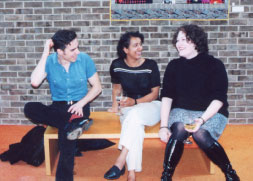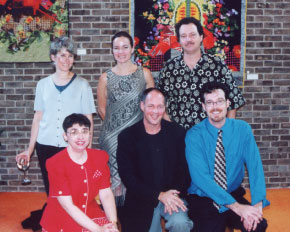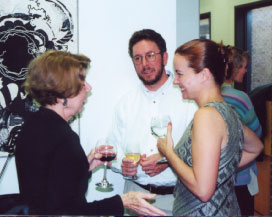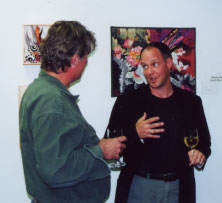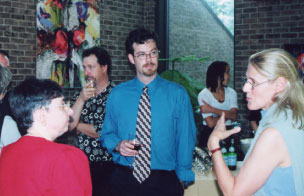Introductory
Comments and a Poem by Beth Ann Fennelly
I’ve been asked by the Joseph Campbell Chair in Philosophy and originator
of this event, Elfie Raymond, to make a brief introductory comment affirming
the centrality of poetry and philosophy in our lives. So I stand before
you faced with two unpleasant options-one is to affirm the centrality
of something I’m not convinced is central. The other is to disappoint
Elfie Raymond. Why do I worry that affirming the place of poetry and philosophy
may be a lie? Well, Joseph Campbell said you can tell what’s important
to a culture by the size of its buildings. I have seen Trump Towers; I
have seen the Superdome; I have seen the country’s sole poetry-only
bookstore, Grolier in Cambridge; and friends, I’m afraid size does
matter. I remember when I arrived early for my orientation at the University
of Arkansas’ M.F.A. program, and took the opportunity to check out
the library’s poetry holdings. I asked the librarian to show me the
poetry journals; she misheard me and showed me the poultry journals. And
chickens outweighed Chaucer, then as now. How many average Americans can
name three contemporary philosophers, or three contemporary poets? So
no, Elfie, no, I’m afraid I can’t affirm the centrality of philosophy
and poetry in our lives.
And yet . . .and yet here’s Elfie, who’s given money to establish
this award, and here are professors and administrators from Sarah Lawrence,
which has supported it. I was lucky enough to be a finalist last year,
and even luckier to be asked to be one of the judges this year to fill
in for Philis Levin, currently abroad enjoying the Amy Lowell Poetry Traveling
Scholarship. I felt so honored when three big boxes of manuscripts arrived
on my doorstep, and I was reminded that for many, many people out there,
poetry and philosophy do occupy a central place in their psyches. And
then three more boxes arrived. And then three more. In the end, David
Baker, Andrew Hudgins, and I were nearly overwhelmed by the passion of
people eager to affirm this centrality. And so, in the end, I do find
myself grudgingly repeating along with William Carlos Williams: “My
heart rouses thinking to bring you news of something that concerns you,
and concerns many men. Look at what passes for the new-you will not find
it there, but in despised poems. Poetry makes nothing happen, yet men
die miserably every day for lack of what is found there.” And I find
myself stubbornly repeating with Auden: “After all, it is rather
a privilege to serve this unpopular art which cannot be turned into background
noise for study or hung on the wall by rising executives, but still stubbornly
insists on being read or ignored.” And as for you out there-you are
a stubborn crowd, insisting on your fidelity to this unpopular art, and
for that I thank you. You’re in for a wonderful reading.
Turning Twenty-Nine
You thought by now you’d be wiser,
not still falling for the old x=y.
You wonder how you’d do if you were
the last person on earth and had to found
a new civilization: could you explain
a magnet? A battery? A light bulb?
You repeat the word bulb. Bulb bulb bulb.
You stop in the nick of time. Time nicks us all
sooner or later, that’s democracy.
Once you were in Russia and a woman
cut your hair. She bent you over a tub,
noosed you in a towel and snipped away.
It was the best cut you ever got.
You drank tumblers of vodka with her husband.
The next day, your last in that country,
you boarded a bus for the Hermitage
and puked in the john until closing.
You didn’t see a painting. Not one.
Somehow, you’re this kind of person.
It’s hard to believe, though
you were once voted Most Likely To Yak
in Russia’s Best Museum with Good Hair.
Don’t you hate it when high school’s right?
Don’t you hate it when second person
swishes its tongue inside your ear?
You wonder how you’d do in solitary confinement.
You can’t do long division in your head.
You don’t know isometric exercises.
Edison’s last words: It is beautiful over there.
Yours: These pretzels are making me thirsty.
You wonder if suffering makes people
more compassionate. Coleridge,
caring for his typhoid son, writing by candle
twenty-three nights into the fever:
Turned a poor (very large & beautiful)
Moth out of the Window in a hard Shower
of rain to save it from the Flames!
That’s one kind of person.
When you visit your father who is dying
at last, and he turns, death-dumb,
and whispers, Did you bring Beth Ann?
You say, No. That’s another.
|

